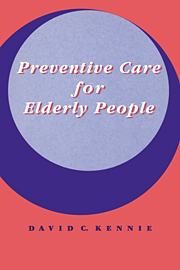Book contents
- Frontmatter
- Contents
- Acknowledgements
- 1 An overall perspective
- 2 What is health in old age?
- 3 The goals of health promotion for elderly people
- 4 A task for everyone
- 5 Critique of strategies
- 6 Cancer prevention
- 7 The prevention of non-cancerous health problems
- 8 Enhancing functional status
- 9 Strengthening support systems
- 10 Summary of problems and strategies
- 11 Tailoring strategies to individuals
- 12 Targeting, screening and surveillance in primary care
- 13 Practical aspects of implementation
- 14 The costs of preventive care and health promotion
- Index
5 - Critique of strategies
Published online by Cambridge University Press: 15 October 2009
- Frontmatter
- Contents
- Acknowledgements
- 1 An overall perspective
- 2 What is health in old age?
- 3 The goals of health promotion for elderly people
- 4 A task for everyone
- 5 Critique of strategies
- 6 Cancer prevention
- 7 The prevention of non-cancerous health problems
- 8 Enhancing functional status
- 9 Strengthening support systems
- 10 Summary of problems and strategies
- 11 Tailoring strategies to individuals
- 12 Targeting, screening and surveillance in primary care
- 13 Practical aspects of implementation
- 14 The costs of preventive care and health promotion
- Index
Summary
In order to safeguard an essentially healthy population from iatrogenic insult, to prevent unnecessary costs both to individuals and to society, and to maintain the scientific integrity of the health professionals concerned, a number of rules or principles have been evolved over the years to define acceptable strategies for the screening of ‘normal’ populations. Rogers et al. have further refined these criteria so they become relevant to the elderly population with chronic illness. Despite this emphasis on screening criteria, the relevant principles are also pertinent to a wide range of other preventive care and health promotional strategies. In those countries where preventive care programmes have been widely practised, national ‘task forces’ have been set up to critique the various strategies and to make reliable recommendations on good practice. Most noticeable of these was firstly the Canadian Task Force on the Periodic Health Examination and subsequently the United States Preventive Services Task Force. These working parties have further developed the above principles to establish new international standards.
The preventive care and health promotional strategies outlined in this book are therefore discussed in the context of these accepted principles. For ease of presentation, each health problem is therefore considered under the following headings.
Importance
Feasibility of detection
Effectiveness of preventive strategies
Cost of applying detection and prevention strategies
These aspects are now considered in more detail.
- Type
- Chapter
- Information
- Preventive Care for Elderly People , pp. 30 - 35Publisher: Cambridge University PressPrint publication year: 1993



